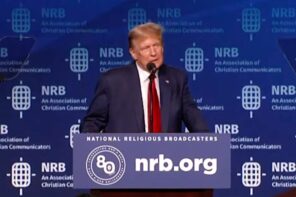On Thursday the Catholic bishops launched the Fortnight for Freedom, the grassroots phase of their campaign to gain official religious status for hospitals, universities, and social service agencies they neither control nor support financially. That status, as has been widely noted, would exempt these organizations from the administration’s requirement that an employer’s health insurance plan cover contraceptives, with no copay or other costs to the employee. But the longer-term goal is to legally shore up the contention that every organization and employer, religious or not, has the right to refuse to comply with any public policies they claim trouble their conscience.
The bishops’ ham-handed lobbying, extreme language, and unyielding position have not helped their cause. Bishop Daniel Jenky compared the president to Hitler; Cardinal Dolan of New York insisted that Obama was trying to “strangle” the Catholic Church; and others have claimed that they would be forced to stop providing health care rather than comply with the contraceptive coverage requirement.
Nor has the bishops’ cause been helped by the fact that just about everyone understands that Catholics have a right to disagree with the Church’s position on contraception, and that providing someone with the means to obtain something that they have a moral right to obtain is also theologically sound practice.
Two weeks of Church-sponsored rallies, masses, marches, and educational symposia are not going to influence the Obama administration to change its mind about the definition of who is entitled to an exemption from public health policy it deems important to women’s health and society. There are just far too many unintended pregnancies that end in either abortion or children poorly cared for to ignore the problem.
If the bishops, who are so unpopular, were the only worry, the exemption would stay narrow—or be narrowed even further. However, just before the Fortnight began, the Catholic Health Association, which includes over 600 hospitals across the United States, released its comment letter on the contraceptive insurance mandate concluding that the Obama accommodation, which would have had insurance companies implement and pay for the mandate in these hospitals, would not work. It was simply not possible to separate functions so neatly, it claimed, and many CHA hospitals are self-insured. Thus, the only answer is to broaden the exemption so that the hospitals are treated the same as the religion itself.
In some quarters the letter was treated as a reversal of position—even a sign of bad faith, or that the bishops had gotten to Sister Keehan and reeled her in. It would be fairer to take the letter at face value, as an acknowledgement that on close examination Obama’s suggested accommodation simply would not work—a reasonable conclusion given the self insurance issue and that it is still not clear whether the insurance companies would pick up the slack in the remaining cases.
So the CHA returns to its original position more strongly, once again requesting a broader definition of a religious employer that includes them. The real issue is not contraceptive coverage, which many Catholic hospitals are already providing on a state-by-state basis where required, and in some cases voluntarily.
Though it’s not the same as acting in bad faith, the CHA is probably not unhappy that the accommodation seems unworkable as it would much prefer to get another bite at the apple and make the case for religious status.
Unless organizations like Catholic hospitals are allowed the same status as the religions themselves, they are likely to be treated under the law much as we treat individual religious persons. And the Supreme Court has already determined that when public policy aimed at everyone conflicts with individual religious beliefs, public policy is the higher good. Justice Scalia in his majority opinion in Employment Division v. Smith, 1990, noted: “We have never held that an individual’s religious beliefs excuse him from compliance with an otherwise valid law prohibiting conduct that the State is free to regulate.”
The CHA seems reluctant to wait for a court decision and instead want to push for a political one by convincing the president to expand the exemption now. It is in good position to press its case politically, as it has, as good lobbyists do, combined advocacy for its positions along with subtle political support for the president’s reelection. Whatever differences CHA may have with Obama on reproductive health policy, CHA is able to look at the big picture. Obama losing a second term would be a disaster for health care, poverty reduction, and all social services. And, unlike the bishops, CHA is more committed to the survival of the Affordable Care Act than to ensuring that it mirror Catholic positions.
While little credit for passage of health care reform was given to the women’s and choice groups that early on acceded to the exclusion of abortion coverage and worked like mad to get it passed, Sr. Keehan was lauded by the media as the single most important figure in its passage when she sided with the administration’s assertion that the ACA did not in any way include funding for abortion. She earned not only a pen at the signing ceremony, but ongoing access to and deference from the White House.
Then, when the US bishops ratcheted up its opposition to the president’s reelection by accusing him of hostility to religion for not giving the Catholic hospitals an exemption, and Catholic columnists in both the secular and religious press bought the claim, adding that Obama had thrown progressive Catholics and Sr. Keehan under the bus, Sr. Keehan again came to the president’s rescue by offering support for his “accommodation”:
The Catholic Health Association is very pleased with the White House announcement that a resolution has been reached that protects the religious liberty and conscience rights of Catholic institutions. The framework developed has responded to the issues we identified that needed to be fixed.
Having decided to press for recognition as a religion, the CHA has another plus going for it in addition to its favored status at the White House: nuns have become heroes. In general Catholic voters, whom the Democrats want to bring closer, are supportive of the nuns but they don’t tend to like the bishops. Catholic health care is one of the few good things we can point to in a Church otherwise plagued by corruption and, yes, pedophilia. Even pro-contraception Catholics are inclined to support the sisters. During the Clinton administration’s attempt at health care reform, Senator Barbara Mikulski (D-MD) made clear, with regard to the provision of a conscience clause for religious hospitals, that whatever the nuns in Baltimore who had cared for her mother wanted they would get.
Nuns are especially popular today after the Vatican foolishly attacked them for caring more about the poor than about opposing gay rights and abortion. Catholic and non Catholic columnists alike praised them to the skies. The sisters, whose claim to oppressed persons status is that the Vatican called them “radical feminists” and slapped their wrists, are more lauded for their courage than Burmese dissident Aung San Suu Kyi, who spent nearly 15 years under house arrest.
Months before the election is the perfect time for the CHA to press its case for an exemption from the policy, which would not only allow it freedom from following the law on contraceptive insurance, but also to assert without scrutiny that any number of health services violate its religious beliefs. In her interview with Kaiser Health News, Sr. Keehan acknowledged that the CHA still has “some very real concerns in the Church that even if you get rid of the coverage of contraceptives, [there may be] problems in the future.”
Up to now, the administration has followed a strategy that is political, but respectful of the constitutional limits on religious freedom. It has correctly taken the position that public policies established to serve the common good require a clear and narrow definition of what is and what is not a religion. We do not just abandon the common good to unexamined claims that a public health or education provider is required by faith not to comply.
We are prepared to give an actual religion an almost free pass to assert what the religion teaches and requires, but not a hospital which holds in its hands the life and health of many of all faiths and no faith, and operates under the laws and regulations of the state. If such entities have any right to an exemption based on religion, those claims should be subject to strict regulatory scrutiny.
It would be wiser to grant no exemption at all than to entangle the state in the adjudication of claims over what religious belief outside the scope of a denomination requires. But if we were to examine claims, on the contraceptive issue we would be forced to conclude that these hospitals do not require an exemption. We would write in the file that any further claims need to be carefully examined given the lack of a good religious argument for refusing to insure employees for contraception. And our trust and confidence in the CHA would be diminished by such a frivolous claim.




